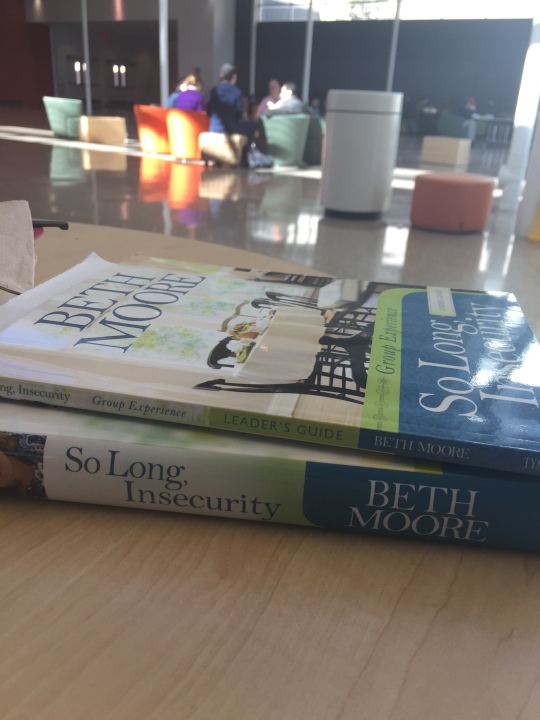So Long, Insecurity: Week 8
Happy Monday!
It’s time for week 8 of SLI. If you have been participating, make sure to click here to see previous weeks. If you haven’t been participating, you can. Buy the book by clicking the picture on my sidebar, and go through these weekly posts.

Here’s a word from Beth this week:
I’m excited for this week’s discussion. We’ve spent some valuable time laying the groundwork to help us understand why we struggle with insecurity and what triggers it. We’ve looked at errors in our thinking-about ourselves and about men-and we’ve started to correct those. We’ve talked about looking at Jesus to regain perspective, and about letting go of our desire to play God. This week we get to move into more practical, hands-on material: what do we do when our insecurity is triggered?
Maybe for years you’ve been reacting the same way. You feel threatened, your insecurity raises its ugly head, and almost before you can blink, you’ve melted into a puddle of hysterical neediness. Trust me, I’ve been there-and it’s not pretty. But hear me on this: it doesn’t have to be that way. No matter how entrenched a pattern is in our lives, we are not domed to be stuck in it forever. Our God is a God of transformation! He is in the business of changing lives. But He will not do it without our consent. We have to be willing to enter into the process. And once we begin, we can use one of the potent tools God has given us: the power to choose.
Here we go with week 8!
A few things about chapter 13:
The most prized possession God gave humankind when He formed Adam from the dust of the earth was the power to choose. Nowhere do we bear the image of our Creator more forthrightly than in the ability to exercise our free will…
By choosing to have a different reaction prior to a different emotion, we can effect an immediate sense of heightened security. The reaction leads to a new feeling, and the new feeling leads to more consistent reactions. Result? We spiral up.
One of the most common human claims is that we can’t change the way we feel. That may be true, but we can change the way we think, which changes the way we act. And as we change the way we act, the way we feel also begins to change. In the breaking of every habit, someone wills it first and feels it later. (pg.239-241)
- How do you respond to this idea that our feelings follow our thoughts and actions? Does it seem possible? Does it give you hope?
- Have your emotions ever changed in response to your actions? Describe a time when you chose to act a certain way because it was the right thing to do, even though it was contrary to your emotions at the time. What happened?
Being secure doesn’t mean always being on an even keel. God made us to experience emotions, and in fact, He also experiences emotions! But our feelings don’t have to be paired with insecurity, and they don’t have to drive the way we respond to situations.
- On pg. 244-245 Beth gives examples of “self-talk”: deliberate statements you can say to yourself when your insecurities are triggered. Have you ever tried this? What was the result? Which of these statements seem most helpful to you?
On page 246 Beth writes:
God gave you your security, and nobody gets to force it from you. You must make up your mind that the only way someone can take it from you is for you to hand it over. You have the right to hold on to security for dear life in every situation and every relationship. It’s the power of choice.
- Does it surprise you to think that you have the power to choose security? How would your life be different if you held on to security “for dear life”?
- What practical steps can you take to help change the way you think? *Check Beth’s suggestions on pg. 257.*
***Here is something to think about from the end of Chapter 14.***
Just because we have estrogen milking up our bloodstream doesn’t mean we have to carry on the insecurities of a preteen girl. We really can grow up. As hard as it is, we really can take responsibility. We really can find freedom. We can sit around and think about how pathetic we are, or we really can pursue some healing-for ourselves and for that preteen girl. You and I…have got to make a definitive decision to be strong for our daughters. And don’t even try handing me the excuse that you’re not a mom so this doesn’t apply to you. The entire generation of adult women in any culture is systematically raising the next, whether they mean to be or not. Every acne-faced middle school girl you pass in the mall, texting on her cell phone or checking out that older guy in the food court, is your daughter. What are you going to do about her? What would you be willing to do for her? Pg. 273
- What legacy do you want to pass on to the next generation of women?
In these chapters I’ve challenged you-and myself-to take a big step. We can exercise that power to choose, and we can make a change. In this section we’ll look at some Scriptures that remind us that God is on our side in this battle. He has given us the power to choose, and He will help us exercise it. He is the one who does the changing, but we have to be willing to take each next step.
One of the very first things we can change is our thinking. If you’ve ever read through the Psalms, you know that David and the other psalmists provide plenty of evidence of their humanness. They’re not on some super-spiritual plane, far above the world’s problems. When we read some of their words, we sense anger, doubt, fear, and grief. But they also call themselves back to the right perspective-often by praising the Lord.
- Read Psalm 42. What complaints does the writer of this psalm make? What emotions does he express?
- The same words are used as a refrain in verses 5 and 11. What does the psalmist remind himself of here? What can we learn from this passage about changing out attitudes by first changing our thinking?
- Read Deuteronomy 30:19-20, taking note of the power we are given to choose. What are the Israelites being encouraged to choose in this passage? What benefits are promised as a result of that choice?
The Israelites didn’t just make a choice once and for all. The next several books of the Old Testament illustrate that they had to choose time and again. Just like us, they made the right choices followed by the wrong ones. They forgot about the Lord’s blessings and had to remind themselves over and over.
It’s easy to get discouraged when we repeat our mistakes. But we shouldn’t give up! We know that they Holy Spirit is working in our hearts. We are called to persevere.
- Read Philippians 3:7-12. What is Paul trying to gain? Based on this passage, what things does he value?
- How might these verses encourage us as we seek transformation?
When we allow the Lord to heal us and change us, we can have a powerful testimony to others. As Beth writes in Chapter 14,
God cured me of my own gross unfaithfulness. He healed my unloveliness with His own love. As I live and breathe, I am not the woman I used to be, but the fact is, I started this journey because I wasn’t yet the woman I wanted to be…
As long as we’re here in these human bodies on the topsoil of planet Earth instead of six feet under shoving up weeds, we’ll always have a few places that could use some curing. And we won’t need curing just for our own sakes. (Pg. 270-271)
Psalm 40:1-3 says, “I waited patiently for the Lord; he turned to me and heard my cry. He lifted me out of the slimy pit, out of the mud and mire; he set my feet on a rock and gave me a firm place to stand. He put a new song in my mouth, a hymn of praise to our God. Many will see and fear the Lord and put their trust in him.” May others put their trust in the Lord when they see His work in our lives.
In your journal:
- Write scripts that will help you combat the most common insecurity triggers you face. *See pg. 244-245 for ideas*
- Ask the Lord for insight as you consider whether there is anything in your close relationships that you need to confront or change. What boundaries might you need to set?
- Write in detail the legacy that you want to leave to the women who come behind you. How do you want them to view themselves? What do you need to deal with so you can set a strong example? Ask the Lord to reveal these areas where you need His transforming power.
Assigned Reading: Chapter 15 and 16. As you’re reading in the book, underline what is jumping out at you, what you think is true, what surprises you, and what seems to be the most challenging. Maybe you highlight the answers to each of those questions in a different color.
Prayer Requests?
What a way to start our week! Have a great Monday!



